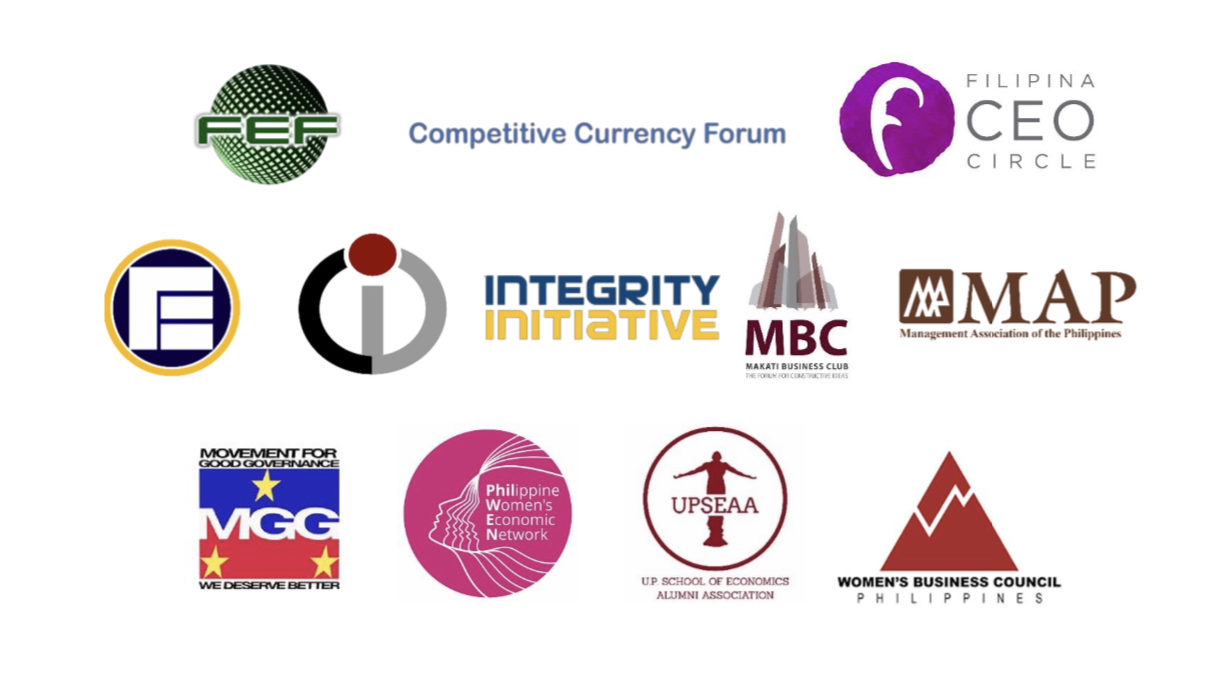
Signatories to the statement against House Bill No. 6398, which calls for the creation of a sovereign wealth fund.
Prominent economists, policy groups and business leaders have banded together to oppose the creation of a sovereign wealth fund as proposed by the Maharlika Wealth Fund bill, saying this ran contrary to the principles of fiscal prudence, pension fund solvency, Bangko Sentral ng Pilipinas (BSP) independence, good governance and transparency.
On Monday, 12 groups issued a collective statement against House Bill No. 6398, which calls for the creation of a sovereign wealth fund (SWF).
The 12 signatories are Foundation For Economic Freedom, Competitive Currency Forum, Filipina CEO Circle, Financial Executives Institute of The Philippines, Institute of Corporate Directors, Integrity Initiative, Inc., Makati Business Club, Management Association of The Philippines, Movement for Good Governance, Philippine Women’s Economic Network, UP School of Economics Alumni Association and Women’s Business Council Philippines, Inc.
“There is at present no gap nor ‘missing institution’ in the economy that needs to be solved by the creation of an SWF. The country does not have a bonanza of commodity surpluses that need to be deployed,” the group said.
“Instead of leaving a legacy of surplus funds to be managed for future generations, the current generation is leaving a legacy of heavy indebtedness which future generations need to pay or refinance,” it added.
Instead of pursuing the Maharlika fund, they said the government must prioritize the management of fiscal deficit and public debt to avoid impediment to the delivery of public services and prevent a downgrade of sovereign investment credit rating.
It was cited that in other countries, commodity-based SWFs are designed to optimally manage the windfall from the disposition of natural resources for the benefit of future generations, recognizing that such natural resources are exhaustible and commodity prices are uncertain in the long run.
On the other hand, non-commodity-based SWFs are designed to manage the accumulated foreign assets from persistent external trade surpluses and surpluses of state-owned enterprises (SOEs), with the objectives of preserving the value of their capital and realizing returns on investments in order to keep the long-term sustainability of the fund.
“In contrast, the Philippines has neither commodity-based surpluses nor surpluses from external trade and SOEs,” they pointed out. “Although the country is rich in mining resources, they remain undeveloped because of restrictive laws.”
Requiring Land Bank of the Philippines and Development Bank of the Philippines to fund the SWF on the ground that they invest in government securities is in “no way a creation of wealth,” the group said, noting this would just be a “round tripping” when funds are diverted.
Meanwhile, they stressed that as the funds of Government Service Insurance System (GSIS) and Social Security System (SSS) belong to the members, it is “not appropriate” to impose on their members such risks on their retirement funds.
Should a portion of their investment funds be diverted to an SWF, the group said the actuarial lives of SSS and GSIS- currently at around 40 to 43 years or already far below the ideal 70 years – would likely be shortened further, because the funds would be invested in higher risk assets.
The provision requiring the BSP to contribute 50 percent of its cash dividends to the national government was also cited as “problematic in many aspects,” as it would override the BSP’s judgment on the macroeconomic and financial situation and its decision on the appropriate allocation of its foreign assets.
“This is a direct assault on the constitutional mandate of the BSP as an independent central bank in promoting price stability and managing exchange rate volatilities,” the group said.
“In a centralized economy, the dominant decision maker can make bad decisions whose cost will affect the whole economy. Even supposedly professionally-run SWFs such as Temasek has incurred large losses from bad decisions. The case of the losses of the Malaysian SWF 1Malaysia Development Berhad (1MDB) due to corruption are well-known.”
Similar issues were raised by Global Source economist Romeo Bernardo. “The hotly-debated congressional bill to create a sovereign wealth fund through the pooling of resources of government financial institutions will add to Philippine financial and fiscal risks. The proposal is poorly-timed, with external balances under stress and government debt and borrowings elevated, and it raises the specter of Malaysia’s 1MDB scandal traced ultimately to poor governance,” he said.